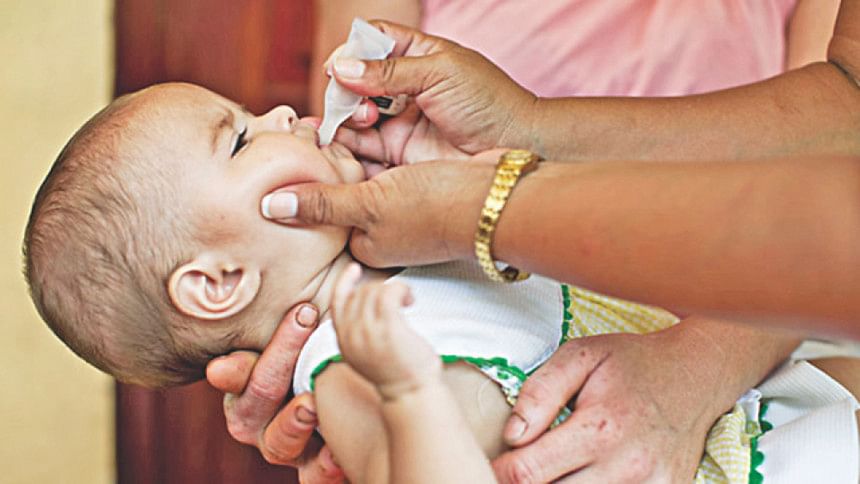84pc Bangladeshi children got vaccines by age of 12-months during pandemic: Unicef

Almost 84 percent of 12-month-old children in Bangladesh received their vaccines during the Covid-19 pandemic, the Unicef said today..
Unicef said the numbers are impressive considering public perception on the importance of vaccines for children declined during the Covid-19 pandemic in 52 out of 55 countries.
The report titled "The State of the World's Children 2023: For Every Child, Vaccination," reveals that the perception of the importance of vaccines for children declined by more than a third in the Republic of Korea, Papua New Guinea, Ghana, Senegal and Japan after the start of the pandemic.
China, India and Mexico were the only countries studied where the perception of the importance of vaccines held firm or even improved, according to the new data collected by The Vaccine Confidence Project and published by UNICEF.
In most countries, people aged under 35 and women were more likely to report less confidence about vaccines for children after the start of the pandemic.
In Bangladesh, health services were initially impacted when the country went into pandemic lockdown in March 2020, leading to health coverage falling below 50 percent in the following months.
However, with the support from Unicef, Bangladesh government moved quickly to address the decline in immunisation, and the monthly uptake of vaccines surpassed pre-Covid-19 levels by October 2020.
Valid immunisation coverage in Bangladesh remains high, with almost 84 percent of children receiving their vaccines by 12 months of age. Valid coverage is when a child receives all vaccines due in their first 12 months according on the national immunisation schedule, according to Unicef.
The pandemic also exacerbated existing inequities. For far too many children, especially in the most marginalised communities, vaccination is still not available, accessible or affordable.
Even before the pandemic, progress on vaccination had stalled for almost a decade as the world struggled to reach the most marginalised children.
Of the 67 million children across the world who missed out on routine vaccination between 2019 and 2021, 48 million didn't receive a single routine vaccine, also known as "zero-dose".
As of the end of 2021, India and Nigeria (both countries with very large birth cohorts) had the largest numbers of zero-dose children but increases in the numbers of zero-dose children were especially notable in Myanmar and the Philippines, adds the report.
In Bangladesh too, geographical and socioeconomic inequities remain, with many children not receiving all scheduled doses, or not receiving the right dose at the right time. Coverage in hard-to-reach areas and urban slums remain low compared to the national coverage.
The number of zero-dose children in Bangladesh is 30,000 children, or less than one percent, of children aged under 1 year, according to the report.
While this represents a remarkable achievement of the immunisation programme in the country, it also leaves pockets of unimmunised children.
In 2022, Unicef delivered 173 million childhood vaccine doses for a value of USD 80 million. These vaccines were funded by Gavi, the Vaccine Alliance, and the Government of Bangladesh.
"The success of the child immunization programme in Bangladesh is a testament to what is possible when there is sustained political commitment and a well-trained and motivated health workforce," said Sheldon Yett, Unicef Representative to Bangladesh.

 For all latest news, follow The Daily Star's Google News channel.
For all latest news, follow The Daily Star's Google News channel. 



Comments